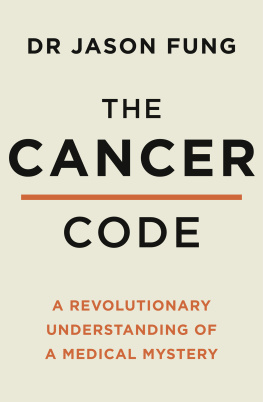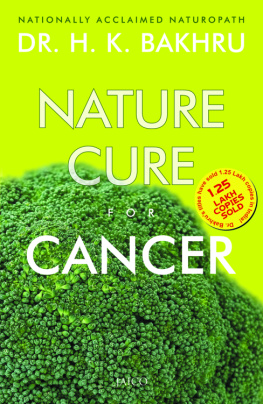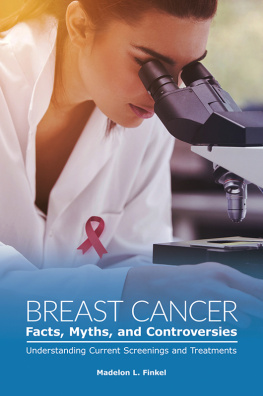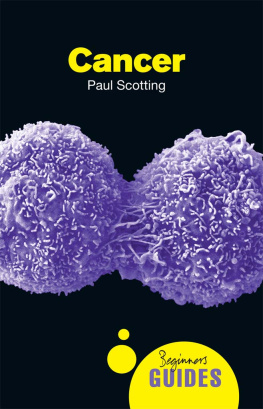ON THE
CANCER FRONTIER

Copyright 2014 by Paul A. Marks.
Published in the United States by PublicAffairs, a Member of the Perseus Books Group
All rights reserved.
No part of this book may be reproduced in any manner whatsoever without written permission except in the case of brief quotations embodied in critical articles and reviews. For information, address PublicAffairs, 250 West 57th Street, 15th Floor, New York, NY 10107.
PublicAffairs books are available at special discounts for bulk purchases in the U.S. by corporations, institutions, and other organizations. For more information, please contact the Special Markets Department at the Perseus Books Group, 2300 Chestnut Street, Suite 200, Philadelphia, PA 19103, call (800) 810-4145, ext. 5000, or e-mail .
Book Design by Linda Mark
Library of Congress Cataloging-in-Publication Data
Marks, Paul A., author.
On the cancer frontier : one man, one disease, and a medical revolution / Paul Marks and James Sterngold. First edition.
p. ; cm.
Includes bibliographical references and index.
ISBN 978-1-61039-253-2 (e-book)
I. Sterngold, James, author. II. Title. [DNLM: 1. Marks, Paul A. 2. Neoplasmshistory. 3. Antineoplastic Agentshistory. 4. Biomedical Research. 5. Cell Transformation, Neoplastic. 6. Medical Oncologyhistory. 7. Neoplasms--therapy. QZ 11.1]
RS431.A64
616.99'4061dc23
2013042849
First Edition
10 9 8 7 6 5 4 3 2 1
To my indispensable partner, Joan H. Marks
CONTENTS
READING ABOUT CANCER in the media can be jarring. One of mankinds oldest known and most deadly diseases is not only discussed far more frequently, it seems, than other serious illnesses (heart disease, for instance); it is often described as though it were part of a moral parable rather than just an enormously challenging medical science problem. The issue is often framed not in terms of the success or failure of a new treatment, or the promise of some new avenue for research, but as a contest between good and evil, competence against incompetence, good intentions versus bad.
Time, for instance, recently blared on its cover, How to Cure Cancer, with a subhead declaring, Yes, its now possiblethanks to new cancer dream teams that are delivering better results faster. Potential magic bullets appeared to have been found by tapping into that great American resource, teamwork, with inspiration coming from some innovative, selfless philanthropists. But only weeks later a sour article in the New York Times Sunday Magazine headlined Our Feel-Good War on Breast Cancer asked, with a bitter edge, Has raising awareness become more important than saving lives? Selflessness and courage were nowhere to be found. A blogger, responding to the article, commented afterward that theres an epidemic of overtreatment, as though it were a known fact that the problem with cancer care was that some ill-intentioned doctors were doing too much for their patients, not too little.
And it is not just doctors who get judged by such moral standards. When patients overcome cancers, it is often attributed to their strong moral fiber, not good fortune that they had a form of the disease susceptible to current therapies or that they quickly obtained treatment at a good hospital. Some cancer self-help books focus on the curative powers of positive thinking, with an implication that succumbing means the patient failed, not that the disease is vicious and unimaginably difficult to stop. Cancer has fallen into a category with issues like immigration and gun controleveryone is expected to have an opinion.
The media coverage reflects the seemingly random intensity and unpredictability of the disease and a widely shared frustration that American ingenuity has failed to find the final cure President Nixon promised when he launched the war on cancer nearly a half century ago. The other war at that time, in Vietnam, was mired in an insurgency. The enemy was relentless, absorbing our bombs and then regrouping and fighting back. The war on cancer, everyone expected, would be different. I think many people felt, instinctively, that it would restore our moral edge.
From the start, the campaign against cancer was laced with a sense of heroism by being compared to the race to the moona race that, of course, we won. It was to be a medical Manhattan Project, another heroic success. And that has been the problem. If American scientists could build an atomic bomb in just a few years in the New Mexico desert, if they could fly a man into the heavens and land him on the moon ahead of the Soviets, if we could cure smallpox and polio, then surely nothing could prevent us from defeating cancer. How could any barrier stand in the way of American spirit, American technology, and American money?
It was a seductive narrative, which in no way prepared people for the reality that all cancers would never be curable by a single pill. The metaphorical failure of the metaphorical war on cancer felt to many people like a reaffirmation of the rottenness of the end of the Nixon era, as though it were a moral failing on the part of government that denied us a cure. It is story without foundation, one that pays no attention to the singular power and elusiveness of the disease itself.
The truth, uncomfortable and inconvenient as it may be, is that medical science has never faced a more inscrutable, more mutable, or more ruthless adversary. It is a unique disease. Cancer is, in a way, the bodys war on itself. The microscopic cellular resources we as a species rely on to multiply, survive, and defeat diseases are more or less shared in equal measure by cancers; cancersthe many maladies lumped together under that nameuse all of the cells capabilities to defeat the treatments we throw at the disease. That has been the medical challenge, to drill deeply into those capabilities and cellular mechanisms, to understand them and then manipulate them. The real secret to cancers tenacity, and to the therapies that ultimately tame it, lies in our advancing ability to understand its biology. That, in part, is the subject of this book.
But the history of cancer research and treatment, particularly since Watson and Cricks brilliant discoveries about DNA in the 1950s, has not been a straight line leading to an inevitable success. A new drug vanquishes all tumors in laboratory mice, then fails in human trials. A seemingly innocuous and long-overlooked chemical suddenly opens a promising door to a new treatment that produces measurable improvements, but often for rare cancers that affect few people. Some breakthroughs, often developed over a period of years at great expense, extend the lives of patients by just a few months. Particularly maddening are the drug trials that seem to failexcept for a near-miraculous cure of one cancer patient, which can be neither replicated nor explained.
Successes and failures in cancer research are rarely absolute because of the vexing mutability of cancer cells, one of their most fundamental characteristics. Tumors go into remission only to come roaring back later in a changed, more potent form that chemotherapeutic drugs or radiation cannot stop.
That gets at the essence of the medical difficulties: first, there is not one genetic change that causes cancer, but hundreds if not thousands, and second, though cancers can and usually do mutate within each patient, the drugs or other treatments we use against them cannot. Thus, new treatments that hit new targets must be endlessly formulated. Scientists struggle not just to understand and outwit this resourceful disease but, on a more human level, to maintain a positive outlook in the face of constant setbacks.
Next page









